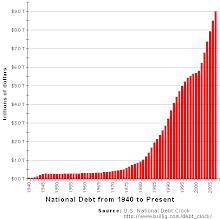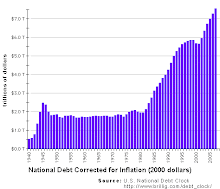
In the March 1, 2009 article "Republican cuts would cost 700,000 jobs: Report," Zachary Roth reports that Mark Zandi, a prominent economic forecaster, suggests that the budget cuts proposed by Republicans will slow economic growth and reduce the number of jobs. The logic is that a primary determinant of the number of jobs is the overall demand for newly produced goods and services, which economists refer to as aggregate demand (AD). And a key source of demand, especially in economic downturns and their recoveries, is government purchases. Less government spending translates into less aggregate demand and fewer jobs.
According to Roth:
A new report by a leading economic forecaster finds that budget cuts passed by the House of Representatives would cost 700,000 jobs over the next two years if enacted.
"The House Republicans' proposal would reduce 2011 real GDP growth by 0.5% and 2012 growth by 0.2%," according to the study, by Moody's Analytics chief economist Mark Zandi. "This would mean some 400,000 fewer jobs created by the end of 2011 and 700,000 fewer jobs by the end of 2012."
Zandi is no left-wing ideologue. He was on the economic team for Sen. John McCain's 2008 presidential campaign, and has advised members of both political parties. His findings point in the same direction as those of an even more pessimistic Goldman Sachs report, leaked last week, which concluded that the proposed cuts would reduce second- and third-quarter growth in 2010 by 1.5 to 2 percentage points.
Although the economy has been growing of late, it's not adding jobs fast enough to start significantly bringing down the unemployment rate, which stands at 9 percent. Writes Zandi: "Imposing additional government spending cuts before this has happened, as House Republicans want, would be taking an unnecessary chance with the recovery."
America already faces a jobs crisis, having lost around 8 million jobs since the start of the recession in late 2007.
Zandi argues that the government does need to cut spending--but that it should wait to do so until unemployment has come down further. "Significant government spending restraint is vital," he writes, "but given the economy's halting recovery, it would be counterproductive for that restraint to begin until the U.S. is creating enough jobs to lower the unemployment rate."
The House proposal cuts spending by around $60 billion from 2010 levels. The Senate and the Obama administration will weigh in before any cuts become law.





